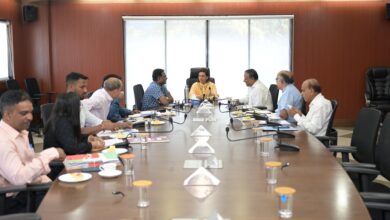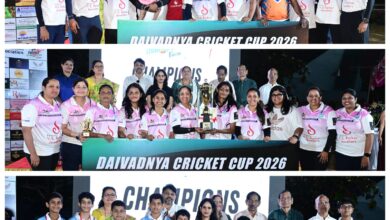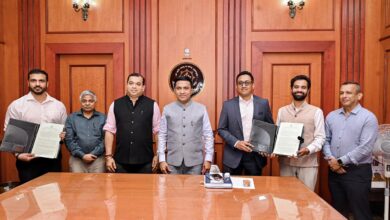
Women in Independent Cinema Call for Equity, Visibility, and Creative Freedom
The panel observed Empathy as a defining element of women’s filmmaking
Panel called for increased collaboration that will offer supportive environment for women creators
23 November 2025: The panel discussion titled ‘A Global India Through Independent Cinema: A Women’s Panel’ brought together four compelling voices — actor- filmmaker Rajni Basumatary, cinematographer Fowzia Fathima, actor-filmmaker Rachel Griffiths, and actor Meenakshi Jayan. The conversation explored how women’s creative and personal journeys are shaping the future of independent cinema.
The discussion opened with reflections on empathy as a defining element of women’s filmmaking. Fowzia spoke of how the entire creative process, from the spark of an idea to the final frame, is grounded in empathy, enabling filmmakers to transform local narratives into stories with global resonance. Rajni added that women often notice the smallest details of life, and it is these subtle observations that allow their films to give voice to stories that might otherwise go untold.
When the conversation turned toward representation, the panel explored whether women feel more seen in the industry today. Rachel shared that her own industry has a growing number of women cinematographers and producers. Fowzia recounted the evolution of the Indian Women Cinematographers’ Collective, which began in 2017 with few members and has now grown to nearly two hundred, spanning juniors to seniors. She explained how the collective fosters mentorship and collaboration, offering the kind of supportive environment women have long needed in the industry. She also celebrated the presence of women cinematographers at IFFI, complimenting the craft of Shelly Sharma in ‘Vimukti’ and the craft of Archana Ghangrekar in ‘Shape of Momo’.”
Rajni recalled how, two years ago, she was referred to a cinematographer from this collective for her own project, affirming the impact of such networks. Meenakshi highlighted Kerala State Government supported initiative that funds films made by women, sharing that her film Victoria grew out of this opportunity. Fowzia, who served on the first selection panel for this Kerala State Government initiative supporting women-led films, pointed out concerns about men submitting projects under women’s names, underscoring the continued need for vigilance.
The panelists then moved into the challenges of balancing filmmaking with personal life. Rachel spoke candidly about navigating the industry while raising three children, suggesting models like alternating work weeks to support women. Fowzia shared the difficulty of returning to her craft after motherhood and expressed gratitude that her career was able to continue, especially with her upcoming commercial movie ‘Train’ featuring Vijay Sethupathi.
On the question of how actors shape on-set narratives, Meenakshi noted that newcomers often lack the freedom to choose their collaborators, but as her career grows she hopes to work with more women filmmakers. Rajni observed that OTT platforms have expanded the kinds of roles available to women, giving them greater depth and presence. Fowzia added that more women actors are now moving into production, widening the circle of creative decision-makers. Meenakshi spoke of her own desire to one day produce films, while Rachel reflected on Hollywood’s long presence of women producers and the hurdles they continue to navigate. Rachel also touched on pay parity, noting that meaningful change requires men to acknowledge the imbalance and support efforts that ensure fairness for women.
When the discussion turned to writing and process, Rajni spoke of grounding her stories in local realities and the generational pain experienced by her region. Her most recent film features an all-women cast to explore gender justice. Meenakshi added that her movie ‘Victoria’ was built around an all-women cast, a choice that often drew questions simply because it shifted the usual frame.
As the panel turned to the realities of making and sustaining films, Rachel noted that filmmakers should create stories that can find their audience, trusting that the right narrative will reach the people it’s meant for. Rajni added that her films have been made on small budgets and were backed by women producers, and she ensured they never faced a loss.
As the session neared its conclusion, the panelists were asked which films they believe everyone should watch. Rachel named Dangal for its celebration of girls; Fowzia chose The Power of the Dog; Rajni recommended Article 15 and Eye in the Sky; and Meenakshi selected Shiva Baby for its portrayal of anxiety, adding with a playful grin that she would also recommend her own film ‘Victoria’.
The session closed on a moment of warmth and possibility. Meenakshi praised the Australian film industry for its progressive landscape and recalled a film she saw at the Adelaide Film Festival that she wished she could act in. Rachel responded with camaraderie, suggesting that the four women could one day collaborate, capturing the spirit of the afternoon: women imagining new futures together, and independent cinema offering the space for those futures to begin.









